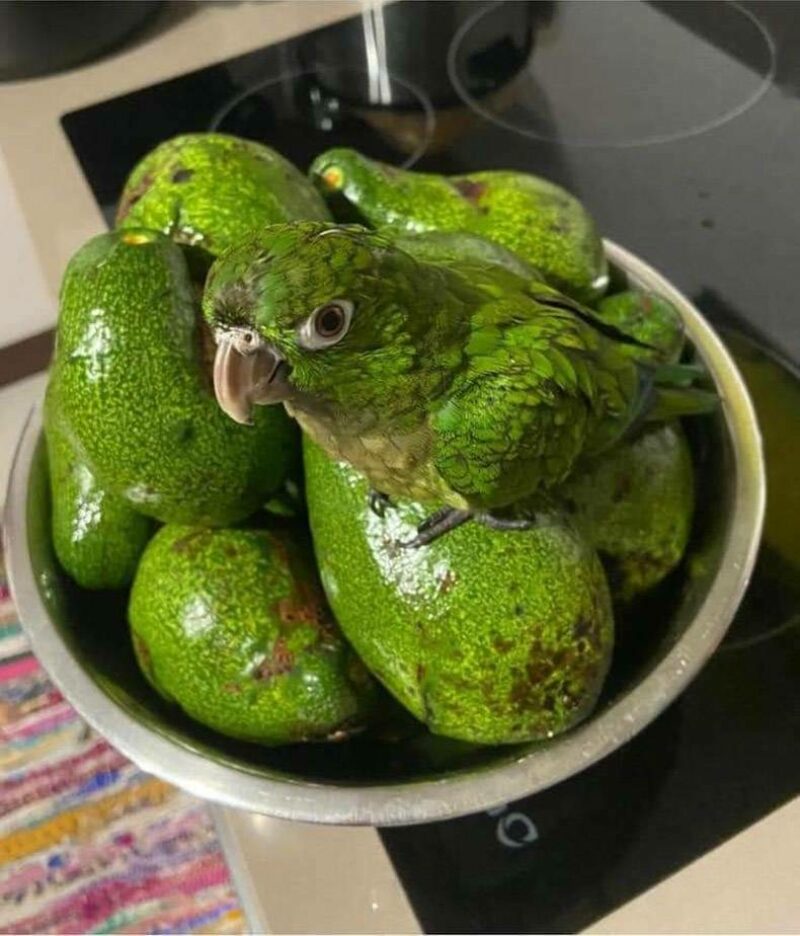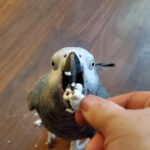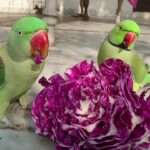Parrots should not eat avocado. Avocado contains persin, which is toxic to parrots and can be fatal.
Parrots are popular pets known for their vibrant feathers and intelligence. Their diet plays a crucial role in their health. Many pet owners wonder which foods are safe for their feathered friends. Avocados, despite being nutritious for humans, pose a significant risk to parrots.
The fruit contains a toxin called persin. Even a small amount of avocado can cause serious health issues in parrots, including respiratory distress and heart failure. Pet owners should be vigilant and avoid feeding avocados to their parrots. There are many other fruits and vegetables that are safe and beneficial for parrots. Always prioritize your parrot’s health by choosing safe food options.

Credit: www.quora.com
Avocado And Parrots
Many pet owners wonder if parrots can eat avocado. The answer is crucial for your parrot’s health. Understanding the risks involved is essential.
Common Beliefs
Some believe that a small amount of avocado is safe for parrots. Others think it’s toxic in any quantity. These beliefs often come from personal experiences.
- Some pet owners feed avocado without problems.
- Others report severe reactions in their parrots.
- There is no consensus among parrot owners.
Scientific Findings
Research shows that avocado contains a toxin called persin. Persin is harmful to many birds, including parrots.
| Food | Contains Persin | Safe for Parrots |
|---|---|---|
| Avocado | Yes | No |
| Carrots | No | Yes |
| Apples (without seeds) | No | Yes |
Studies confirm that even small amounts of avocado can be deadly. Symptoms include vomiting, diarrhea, and heart issues. Immediate veterinary care is needed if ingestion occurs.
Nutritional Profile Of Avocado
Avocado is a nutrient-dense fruit known for its health benefits. It contains a variety of vitamins, minerals, fats, and proteins. This section explores the nutritional profile of avocado in detail.
Vitamins And Minerals
Avocado is rich in several essential vitamins and minerals. These nutrients support overall health.
- Vitamin K: Important for blood clotting and bone health.
- Vitamin E: Acts as an antioxidant and helps skin health.
- Vitamin C: Boosts the immune system and aids in collagen production.
- Vitamin B6: Supports brain health and energy metabolism.
- Folate: Crucial for cell division and DNA production.
- Potassium: Helps regulate fluid balance and muscle contractions.
- Magnesium: Supports muscle and nerve function.
Fats And Proteins
Avocado is known for its healthy fat content. It contains beneficial monounsaturated fats. These fats support heart health.
Here is a table summarizing the fat and protein content:
| Nutrient | Amount per 100g |
|---|---|
| Monounsaturated Fats | 9.8g |
| Polyunsaturated Fats | 1.8g |
| Saturated Fats | 2.1g |
| Proteins | 2g |
Avocados also provide a small amount of protein. This helps with tissue repair and growth. While not a major protein source, it contributes to a balanced diet.
Toxic Components In Avocado
Avocados are delicious and healthy for humans. But for parrots, avocados are dangerous. The main reason is the presence of toxic components in the fruit.
Persin Toxicity
One of the most harmful substances in avocados is persin. Persin is a natural fungicidal toxin. It is found in the leaves, fruit, seeds, and bark of the avocado tree. For parrots, persin can be deadly.
The level of persin varies among different types of avocados. Even a small amount can be harmful to parrots. It is best to keep avocados away from your feathered friends.
Symptoms In Parrots
If a parrot eats avocado, symptoms can appear quickly. Here are some common signs to watch for:
- Difficulty breathing
- Weakness or lethargy
- Swollen neck and chest
- Heart arrhythmia
- Sudden death
These symptoms are serious and require immediate veterinary attention. If you suspect your parrot has eaten avocado, contact your vet right away.
To keep your parrot safe, avoid feeding them any part of the avocado. Always check your food for hidden avocado ingredients.

Credit: www.reddit.com
Signs Of Avocado Poisoning
Parrots are wonderful pets, known for their vibrant colors and playful personalities. But certain foods, like avocado, can be toxic for them. Recognizing the signs of avocado poisoning is crucial for your parrot’s health. In this section, we will explore the physical symptoms and behavioral changes that indicate avocado poisoning.
Physical Symptoms
Avocado poisoning manifests through several physical symptoms in parrots. These symptoms can be immediate or take some time to show.
- Difficulty Breathing: Avocado toxins can cause respiratory distress. Your parrot may struggle to breathe.
- Swollen Neck and Head: Swelling around the neck and head area is common. This can be a sign of fluid build-up.
- Weakness: Your parrot might appear lethargic. They may have trouble standing or flying.
- Diarrhea: Digestive issues like diarrhea can occur. This is a sign of internal distress.
Behavioral Changes
Behavioral changes are often the first signs of avocado poisoning. Keep an eye on your parrot’s actions and mood.
- Loss of Appetite: A poisoned parrot may refuse to eat. This is a major red flag.
- Increased Aggression: Your usually calm parrot might become aggressive. This change can be due to discomfort.
- Restlessness: The bird may seem uneasy or restless. They may be unable to find a comfortable position.
- Reduced Vocalization: Parrots love to chirp and talk. A sudden drop in noise levels can indicate a problem.
Being aware of these symptoms can save your parrot’s life. Always consult a vet if you suspect avocado poisoning.
Emergency Response
Parrots should never eat avocado. It’s very toxic to them. If your parrot has eaten avocado, it’s an emergency. Immediate action is needed to save your parrot’s life.
Immediate Actions
Act fast if your parrot eats avocado. Follow these steps:
- Remove any remaining avocado from your parrot’s reach.
- Keep your parrot calm and observe its behavior.
- Check for symptoms like vomiting, diarrhea, or difficulty breathing.
- Contact your veterinarian immediately for advice.
Veterinary Care
Take your parrot to the vet right away. The vet will likely perform the following:
- Examine your parrot for signs of toxicity.
- Administer activated charcoal to absorb toxins.
- Provide supportive care like fluids and oxygen.
- Monitor your parrot’s condition closely for 24-48 hours.
Veterinary care is crucial for your parrot’s recovery. Always follow your vet’s instructions.
Safe Alternatives
Avocado is harmful to parrots. But there are many safe alternatives that are both tasty and nutritious. These alternatives provide essential nutrients without any risk to your feathered friend. Let’s explore some healthy fruits and nutritious vegetables that are safe for parrots.
Healthy Fruits
Fruits are a great source of vitamins and minerals. Here are some fruits that are safe for parrots:
- Apples: Remove seeds as they are toxic.
- Bananas: Rich in potassium and easy to digest.
- Blueberries: Packed with antioxidants and vitamins.
- Oranges: Provide vitamin C but offer in moderation.
- Grapes: Sweet and hydrating, but limit the quantity.
Always wash fruits thoroughly. Cut them into small, bite-sized pieces for easy eating.
Nutritious Vegetables
Vegetables are essential for a balanced diet. Here are some vegetables that are safe for parrots:
- Carrots: Excellent source of vitamin A and fiber.
- Broccoli: Rich in vitamins K and C.
- Spinach: Contains iron and calcium but offer in moderation.
- Peppers: Full of vitamin C and can be colorful fun.
- Sweet Potatoes: Loaded with beta-carotene and fiber.
Steam or boil vegetables to make them soft. Avoid adding any spices or salt.
| Fruit | Key Nutrient |
|---|---|
| Apples | Vitamin C |
| Bananas | Potassium |
| Blueberries | Antioxidants |
| Oranges | Vitamin C |
| Grapes | Hydration |
Preventive Measures
Parrots are curious creatures and love to explore new foods. However, some foods can be harmful. Avocado is one such food. Taking preventive measures can keep your parrot safe. Below are important guidelines to follow.
Dietary Guidelines
It’s crucial to know what your parrot can and cannot eat. Avocado contains persin, a toxin dangerous for parrots. To ensure your parrot’s safety, follow these dietary guidelines:
- Never include avocado in your parrot’s diet.
- Offer a variety of fruits and vegetables, excluding avocado.
- Consult a vet for a balanced diet plan.
Household Safety
Preventing your parrot from accidentally consuming avocado requires household safety measures. These steps are essential:
- Store avocados in a secure place, out of your parrot’s reach.
- Ensure family members are aware of the avocado risk.
- Clean any avocado remnants from surfaces immediately.
- Monitor your parrot during meal prep to avoid accidents.
Implementing these guidelines and safety measures will help keep your parrot healthy and happy.

Credit: www.reddit.com
Consulting A Veterinarian
Understanding whether parrots can eat avocado is crucial. Avocado can be toxic to parrots. Consulting a veterinarian ensures your parrot’s safety. A vet provides expert advice on your parrot’s diet. Regular consultations help prevent health issues. Let’s explore the importance of vet consultations.
Routine Check-ups
Routine check-ups are essential for your parrot’s health. Schedule visits every six months. Regular visits help detect problems early. A vet checks your parrot’s weight, feathers, and beak. They also examine your parrot’s overall health. Routine exams include blood tests and fecal exams.
| Check-up Activity | Frequency |
|---|---|
| Weight Check | Every 6 months |
| Feather Inspection | Every 6 months |
| Beak Examination | Every 6 months |
| Blood Test | Annually |
| Fecal Exam | Annually |
Emergency Contacts
Emergencies can happen at any time. Always have an emergency contact list. Your list should include your vet’s phone number. Also, include an after-hours emergency clinic. Keep this list in a visible place.
- Veterinarian Phone Number: (555) 123-4567
- Emergency Clinic: (555) 987-6543
Quick action can save your parrot’s life. Knowing who to call reduces stress. Be prepared for emergencies at all times.
Conclusion
Feeding avocado to parrots can be dangerous due to its toxicity. Stick to safer fruits and vegetables. Always research before introducing new foods to your parrot’s diet. Ensuring their health and well-being is crucial. Proper nutrition leads to a happy, healthy parrot.
Ryan Everhart is a passionate bird enthusiast and blogger, primarily writing on his website, Avian Whispers. His journey into the world of bird blogging began with a deep interest in parrots, a species that captivated his attention for their intelligence and social behavior. Over time, his content expanded to cover a broader range of bird species, offering insights into bird behavior, care, habitats, and conservation.
Ryan is dedicated to educating his audience, which includes both new bird owners and seasoned enthusiasts. His writing is filled with personal experiences, expert knowledge, and practical advice on bird care. Through Avian Whispers, he aims to foster a deeper appreciation for birds, emphasizing their role in nature and the joys of having them as pets.
Starting with articles focused on parrots, Ryan’s work now encompasses a diverse range of topics such as feeding, training, habitat enrichment, and bird health. His love for birds extends beyond parrots, diving into various avian species. His informative and heartfelt writing reflects his commitment to the well-being of birds and the desire to help others connect with these creatures.
As a growing voice in the bird blogging community, Ryan strives to provide a platform where bird lovers can learn, share experiences, and connect over a shared passion for avian life. His blogs are not only educational but also serve as a reminder of the importance of protecting and nurturing the bond between humans and birds.




